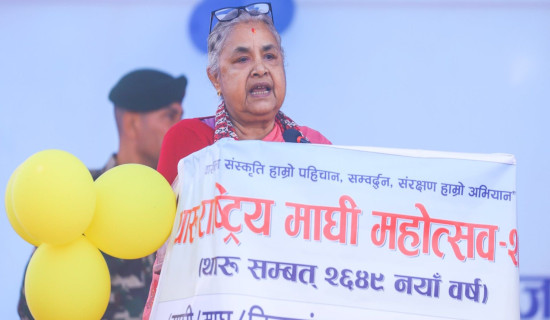- Thursday, 15 January 2026
‘Bhuwo and Bhasso’ festival begins in Bajura
By Sher Bahadur Sharki,Bajura, Dec. 31: The atmosphere in most villages of Bajura is vibrant with the celebration of ‘Bhuwo and Bhasso’ since Monday morning.
The cultural festival, based on the story of the Pandavas and Kauravas, began on Monday, drawing locals to play ‘Bhuwo and Bhasso’.
In every village, locals have started playing ‘Bhuwo’ holding shields and swords, accompanied by traditional drums.
This festival, rooted in tales of bravery, is celebrated during the leisure period after the harvest. Starting on the evening before the new moon day of the month of Poush, it involves lighting a wooden log.
Even the younger generation of people attired in traditional Daura Suruwal participate in it wielding shields swords and sticks while dancing.
According to folklore, this festival commemorates the day the Pandavas celebrated their victory after the epic battle with the Kauravas during the Treta Yuga.
Songs narrating the Pandavas’ victory are also part of the celebrations.
The festival is primarily observed in various places across Bajura, including Himali, Swamikartik, Jaganath, Budhinanda in the northeastern Himalayan region, and Badimalika, Gaumul, Badiganga, Tribeni, and Khaptad Chededaha rural Municipalities.
The tradition of playing ‘Bhuwo and Bhasso’ is also practised in nearby districts like Achham, mostly in villages like Balelta, Tuka, Bherasain, Babla, and Bataligaun, and in Bajhang in villages like Chhanna, Golai, Padhes, Thalara, and Bhatikhola.
Taking advantage of this festival, even family members working abroad often return home to play ‘Bhuwo and Bhasso’ and join the celebrations.
Kalak Katuwal of Banegau, Budhiganga Municipality-4, said that torches are still lit at midnight in memory of the Pandavas, who needed light for their battle at night.
He said, “Bhuwo festival involves dancing with swords in hand and playing traditional drums. Throughout the night, wooden torches are lit, and Deuda songs are sung.”
During this festival, locals also engage in various games. According to Katuwal, the tradition of playing ‘Chhait’ also existed during this time.
The ‘Chhait’ involves visiting a house where a family’s eldest son has completed a year and seeking blessings for the child by singing tales of Lord Krishna in the courtyard. The family hosts a feast, inviting the entire village.
This festival is also an opportunity for villagers to organise celebratory feasts, called ‘Beth’ when someone gets a new job, is promoted, or experiences happiness in the family, marking its significance.
Two to three days after the festival begins, locals go around collecting alms and finally conclude the celebrations with ‘Bhuwo Bhasso’.




-square-thumb.jpg)












